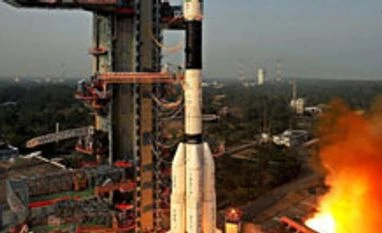Government allocated Rs 470 cr for GSLV Mk III launch
GSLV Mk-III launch vehicle is under advanced stage of development
)
India's first indigenously designed and developed high thrust cryogenic engine meant for next generation GSLV Mk-III launch vehicle is under advanced stage of development. The engine will be used for powering the India's heaviest rocket under development-geosynchronous satellite launch vehicle (GSLV) Mk-III with a capacity to put into orbit satellites weighing four tonnes.
The endurance hot test of high thrust indigenous cryogenic engine of GSLV Mk III has been successfully conducted for a duration of 800 seconds on July 16, 2015. Further tests are planned under high altitude conditions and stage configuration, prior to the realisation of flight stage.
The developmental flights of GSLV Mk-III are targeted for completion by 2017 timeframe and the production of the cryogenic engine would commence thereafter, said Union Minister of State (Independent Charge) Development of North-Eastern Region (DoNER), MoS PMO, Personnel, Public Grievances & Pensions, Atomic Energy and Space, Jitendra Singh said in a reply to unstarred question in Lok Sabha today.
The high performance cryogenic engine was designed and developed at its Liquid Propulsion Systems Centre (LPSC) in Kerala. The LPSC has also developed a smaller cryogenic engine (12.5 ton propellant) and successfully flight tested it in GSLV Mk-II vehicle on January 5, 2014. The bigger cryogenic engine has higher fuel capacity of 27 tonne as compared to 12.5 tonne that powers GSLV Mk-II.
The indigenous cryogenic engine will be used for powering the cryogenic stage (C25), the upper stage of GSLV Mk-III launch vehicle of ISRO, which can put satellites of up to 4 tonnes in Geosynchronous Transfer Orbit (GTO).
GSLV Mk III is conceived and designed to make ISRO fully self reliant in launching heavier communication satellites of INSAT-4 class, which weigh 4500 to 5000 kg. It would also enhance the capability of the country to be a competitive player in the multimillion dollar commercial launch market. The vehicle envisages multi-mission launch capability for GTO, LEO, Polar and intermediate circular orbits
GSLV-Mk III is designed to be a three stage vehicle, with 42.4 m tall with a lift off weight of 630 tonnes. First stage comprises two identical S200 Large Solid Booster (LSB) with 200 tonne solid propellant, that are strapped on to the second stage, the L110 re-startable liquid stage. The third stage is the C25 LOX/LH2 cryo stage. The large payload fairing measures 5 m in diameter and can accommodate a payload volume of 100 cu m. Realisation of GSLV Mk-III will help ISRO to put heavier satellites into orbit.
More From This Section
Don't miss the most important news and views of the day. Get them on our Telegram channel
First Published: Aug 05 2015 | 7:46 PM IST
